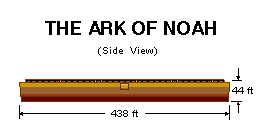

Actual Dimensions of the Ark
Height: 30 cubits; Width: 50 cubits; Length: 300 cubits
These dimensions were very special; these unique proportions made the
Ark uniquely stable in the water. It would have been almost impossible to
capsize. If you build a scale model the kids can test it in the water and
see for themself how stable it is. God knew what He was doing, even if Noah
didn't. These dimensions made the Ark in the proportions of 30:5:3, Length:Width:Height.
The top piece was probably a skylight and served for ventilation, with its
sides open. The above drawing is based on the Bible and on eyewitness accounts
from people through history who have seen it on the mountains of Ararat. There
were two cubits in use in ancient times and so there is some uncertainty of
the exact size. If the 17.5 inch cubit were used the Ark would be 437 ft
X 73 ft X 44 ft. If the longer cubit were used (20.6 inches), the Ark would
be about 517 ft X 86 ft X 51 ft in size. It would be possible to fit at
least 24 standard-sized mobile homes (6 long and 4 wide) on each deck.
Another way to describe it is that the total deck area of the Ark is like
20 college basketball courts.
Making A SCALE Model
You will need a piece for the main body of the Ark and a second smaller,
narrower piece for the top. A piece of 2X4 wood will make an Ark about a
foot and a half long. If you want a smaller model, shop around at a lumber
store, with a ruler and calculator in hand so you can check the proportions.
You must shop for wood with the proper width to height ratio; you can always
cut the wood off the proper length-IF the width and height are correct first.
If you have a table saw available to you, a piece of wood could be cut lengthwise
to give the proper proportions.
Teaching Creation Concepts--Noah's Ark
If you shop around you may be able to find wood which comes reasonablly close to the proper proportions of width to height. If so, the wood can be pre-cut before the children's program and the children can then glue or nail the two pieces together and perhaps stain or paint them at the meeting so that each child can take home their own model. This is bound to teach the parents as well.
Important lessons to make the Flood story relevant are the following:
A. The God of the Bible is a God who judges sin--He did something about
evil in the world in the past and He says He will again when Jesus Christ
returns.
B. The God of the Bible is the God of all people. He created us all
and so he had the right to judge. God started over with Noah's family
so there would be less evil in the world.
C. God's word is true and completely trustworthy, therefore we can count on His promises today.
D. The world was a nicer place to live before the Flood. This means the Flood is the reason we have bad weather today. The Flood changed the Earth.
Another possible activity for kids is to obtain some wide roll paper, cut
off three large strips of it and, after teaching the story, split the children
into three groups and have each group plan where to put all the animals, food,
and living quarters in the Ark. Each paper represents one deck of the Ark.
Another activity that both adults and kids enjoy is to find an open grassy
area or a field where you can measure off the dimensions of the Ark and mark
the four corners with something. If possible, you may be able to find
a pole of some kind that would be about the right height and it could be
used for one of the four corners. Have people walk around the entire
outside perimeter of the marked off Ark. This makes an impression on
people because they realize how really large the Ark was.
(This is an updated version of a page in the book Creation Activities for Kids.)